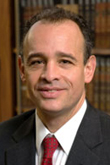
Prof. Christopher Celenza is Professor in the Department of German and Romance Languages and Literatures at Johns Hopkins University, Baltimore, Maryland. In the 90’s he was a Fulbright Scholar to Italy where he carried out a research project on the correlations between Italian Renaissance thinkers and Greek philosophers.On 2010 he was appointed Director of the American Academy in Rome and board Member of the U.S. – Italy Fulbright Commission.What follows is an interview carried out by the Fulbright Commission on the experience of Professor Celenza as Fulbright Scholar and as Fulbright Board Member.
Fulbright Commission: Professor Celenza could you please tell us why you chose to participate in the Fulbright Program in the ‘90s? What were the main factors which led you to choose Fulbright instead of other cultural exchange programs?
Professor Celenza: I had a strong interest in studying the Italian Renaissance, and specifically the Latin language sources in libraries in Italy, especially Florence’s famous laurentian library, its National Library, and then of course the Vatican. The Fulbright was a natural!
F: In the 90’s you came to Italy to carry out your research projects in Florence. Could you tell us something about your research project?
C: I came to study the history of philosophy — specifically how Italian Renaissance thinkers interpreted early Greek philosophy. As time went by, I did some work on that topic, especially on the philosopher Marsilio Ficino, (1433-99) and his work and thought on Pythagoras. But — as often happens — I found new projects as I was investigating. So I also wound up working on a satirical dialogue on the papal court, written in Latin in 1438. It became the basis for my first book.
F: When you recall your stay in Florence what is the first image that comes up to your mind? How was it living in Italy 20 years ago?
C: The first image that occurs is the first time I walked into the Florentine Duomo, seeing on my left Paolo Uccello’s portrait of the famous mercenary captain John Hawkwood. But what sticks most in my mind is walking the city — it was my first extended experience as an adult outside of the US, so Florence was a special place, and I felt I had to get to know it completely. The Franciscan Church of Santa Croce was amazing — a revelation to me then, not only for Giotto’s famous frescoes, but also because it was there that many of Florence’s civic leaders were buried. I would return regularly to the tomb of Leonardo Bruni, beautifully executed by Rossellino. Then of course, seeing and holding in my own hands books that were five hundred years old and were written by the very intellectuals I was studying: that was just an indescribable feeling and a palpable connection to the past.
In addition, I have always been a “foodie,” so when I wasn’t in libraries, I was in the markets, eating at the Trattoria inside the Mercato San Lorenzo (I lived relatively close, in the Via San Gallo), or picking up fresh pasta in the Mercato Sant’Ambrogio. I would work it off by going on long runs, sometimes all the way up to Fiesole (extra gnocchi after that one!). Back then, of course, the unit of currency was the lira, so getting accustomed to all the extra zeroes took some time. And there were notable events: one that sticks in my mind was the bombing of the Uffizi on 27 May 1993. Though it was late, I was awake for some reason and remembered hearing it from all the way across the city. Only in the next morning did I find out what had happened. It remains a mystery who exactly was the culprit, but it was a signal: Italy was just beginning then to undergo the tumultuous political realities associated with the “clean hands” movement, and great changes were underway.
F: Professor Celenza you participated in the Fulbright Program in Italy and, later on, you were appointed as a board member of the Fulbright Commission Board in Italy. As a board member how has your perception of the Fulbright Program changed compared to your previously experience as a Fulbrighter? For example, according to your experience what have been the most important accomplishments that the Fulbright Program in Italy has achieved in the last years?
C: I think that there will always be a differing perception once you are on the “inside” of an organization. Being part of the Board has allowed me to see, first of all, how hard the staff works. This was true back when I was a Fulbright Fellow, of course, but less apparent, since I was not in close contact with the staff. It has also been important to see both the US State Department and the Italian Ministry of Foreign Affairs working side by side. It is clear that Fulbright Commission in Italy performs an important role: when two cultures can meet in the realm of culture — academics, the arts, the world of science — I think that political interaction becomes easier, and potential frictions are smoothed away more easily than they might have been. The Commission has has accomplished much in the last years, not least the hiring of Paola Sartorio as Executive Director. In times of governmental belt-tightening, a broad, expansive vision is necessary to help raise funds, and Paola Sartorio has that kind of a vision.
F: Just one more question Professor Celenza. If you could describe the Fulbright Program in three words you would say that the Fulbright Program is…..
C: Dynamic, interdisciplinary, and necessary.
On June 27, 2014 Professor Celenza will end his assignments at the American Academy in Rome and at the U.S. – Italy Fulbright Commission. The Fulbright Commission would like to thank him for his great support to the Program throughout all these years.
